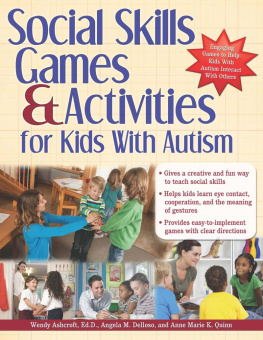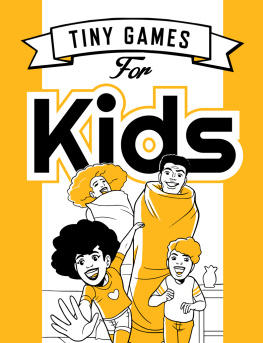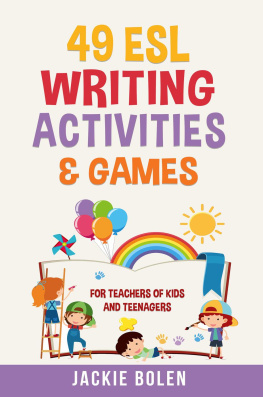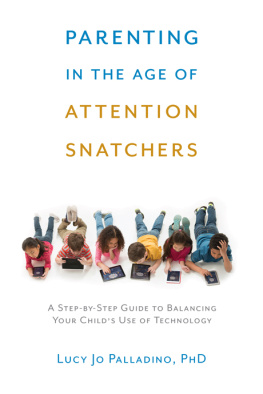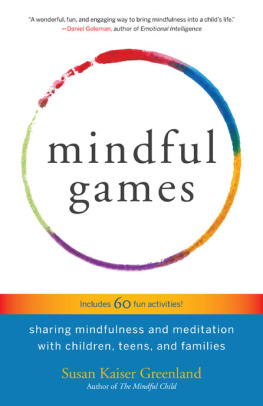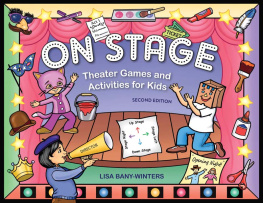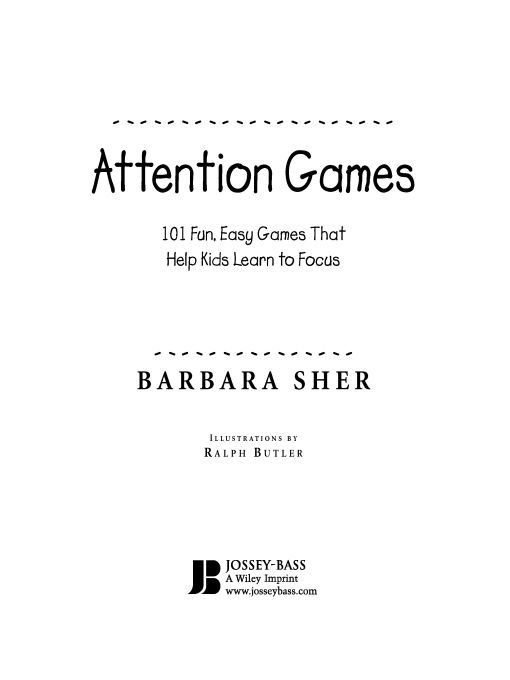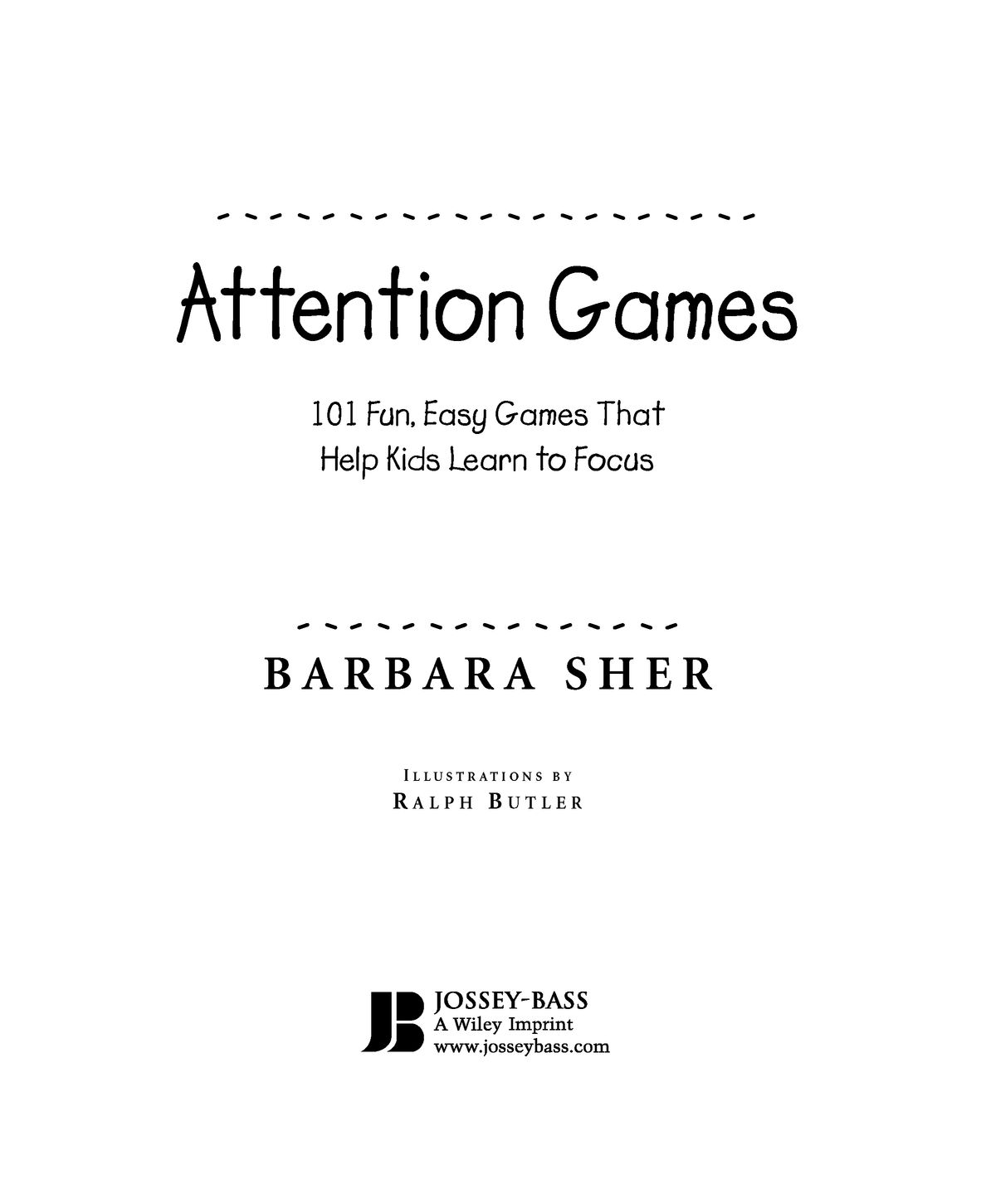Table of Contents
This book is dedicated to all the unique children I have had the joy and honor of working and playing with.
Acknowledgments
To make a book, an author needs a publisher, editors, an artist, and a production crew. For this I have my very able editor, Kate Bradford; her competent assistant, Connie Santisteban; a creative illustrator, Ralph Butler; and a production crew headed up by the very capable Justin Frahm. Im grateful for them all.
To come up with ideas for the text, an author needs inspirational coworkers and friends who are equally interested in the world of children. For this I have the Dream Team at the Special Education/Early Childhood Program in the Northern Mariana Islands of Saipannamely, Dora Palacios-Won, Mark and Patty Staal, Jerry Diaz, Fidelia Ruben, Tracy Nance, Mercy Tisa, Ataur Rahman, Judy Hawkins, Yollanda Lelly, and Rita Olopai. I appreciate and adore them all.
To take pleasure in the writing process, an author needs loving support from friends and family. For this I have many wonderful people: Marissa and Mark SherKenney; Roxanne Sher-Skelton, Ehren Olson; Anna Sher; Fran Simon; Trisha and David Ferlic; Shirley Sher; Don Cohen; Monty Sher; Glo Harris; Bonnie, Jenna, Marc, Jacob, and Leslie Wilson; Maxwell, Griffin, Jessica, and Stewart Evans; Jenny Slack; Nolan and Manny Mariano; Rita Bonnici; Susan Book; Jill Derickson; Ericka Frink; and all my precious Humboldt County buddies. I love them all back.
But to make my book have heart, this author needed children to field test the games. My deep appreciation goes to all the children I play with every day in my work, especially the ones who show me that there really is something special about being special. Thank you for teaching me that humans come in many flavors. And they are all good.
Introduction
If you want to focus childrens attention, you first have to capture their interest. In this book, Ill show you how to get childrens attention with fun and interesting games and how to help them expand their powers of attention in ways that will benefit them throughout their lives.
Everyone is paying attention to something. What that something is and how long the attention is captured are the variables.
There are two forms of attention. One is open and global; you light on many different aspects of your surroundings for short periods of time. Open attention gives you an overall impression of your environment. Think of being at a party. You become aware of the general feel of the party by noticing peoples body language as well as different sounds, smells, and sights. Your attention focuses on many things fleetingly to give you a holistic sense of what is happening. Or think of riding a bike. When you ride a bike, you can attend to steering, pedaling, and the traffic around you while also enjoying the feeling of the breeze blowing through your hair.
The second form of attention is more focused; you concentrate on one thing for long periods. Focused attention requires active filtering of excess information, and you notice details in sequences rather than all at once. Whereas global attention is like an overhead light, focused attention is like a flashlight with a narrow beam. This is the kind of attention required to do things like follow instructions, write an article, or do a crossword puzzle.
Everyone needs both of these types of attention. Open attention gives us a lot of information quickly and encourages creativity by causing us to notice connections and make new patterns. This creative trail helps us find new ways of seeing old things. At the same time, though, nothing can be accomplished without the absorbed, one-step-at-a-time perseverance of focused attention.
We do best when we are able to shift easily between an open state of awareness and a focused one.
Typical behavior for a child diagnosed with Attention Deficit Disorder (ADD) is to notice everything and filter nothing. Whereas another child may focus on the teacher, the child with ADD may instead notice the buzzing fly in the room, the birds fluttering in the trees outside the window, the whispering in the back of the room, the holes in the ceiling tile, and how the air from the vent is making a childs hair ribbons ripple. As one mother pointed out, One thing about my kidshe sure is observant. She notices things no one else would notice, and she sees relationships between stuff out there that no one else would ever think of.
There is often a similar pattern in not being able to filter out the surrounding sounds or to resist going on a finger safari to reach out and touch all there is to touch.
And yet as Thomas Armstrong points out in his book Myth of the ADD Child, there is substantial evidence to suggest that children labeled ADD do not show distractibility in specific situations. One mother of a child diagnosed with ADD said, My child is capable of long periods of concentration when he is watching his favorite sci-fi video or examining the inner workings of a pin-tumbler lock. It is also known that a child with attention difficulties can frequently focus well in a one-to-one situation with a caring adult and an activity that is of interest to the child.
As Dr. Mel Levine points out in his book A Mind at a Time, theres more thats right than wrong with these kids. Levine has seen children who suffer with weak attention control when young turn into remarkable adults. He comments, I believe these children are challenging types of human variation rather than deviation.... What a crime to assume simply that all of these kids are damaged goods. After many years working with these individuals, I am impressed with how many of them turn out to be extraordinary adults. We just have to get them there.
Most of us use our own unique combination of open and focused attention. All of us would benefit from learning how to be better at one type or the other. This book is geared toward the wellness model, which assumes that no person is broken and that everyone can gain from appropriate experiences. Being able to shift fluidly between open attention and focused concentration is a useful skill that everyone can learn and improve on.
Ideally we teach our children the skills of open and focused attention as infants, when they undergo the most rapid brain development. During this period, the childs brain is becoming hard-wired, and she is particularly receptive to experiences. There are many games here to help the infant and toddler develop good attention skills from the start.
There are many games for preschool children that will encourage them to notice details in life. The more we notice the different aspects of a situation, the longer we will attend. Think about experiences you have had. For example, if someone points out to you a variety of wildflower, you are much more likely to pay attention to those flowers and even look for them the next time you go for a walk in the woods. Knowing about details in life increases your attention span.
There are many games in this book for school-age children that are novel to their routine experiences. Novelty raises a persons arousal level and therefore increases attentiveness. In order to learn, we all have to have a certain level of arousal. Too low, and we feel too sleepy to pay attention; too high, and we are too fidgety. It is thought that hyperactive children are actually trying to raise their arousal level because they have low interest in routines. Novelty sharpens their interest and helps them focus; their need for novelty explains why they do best in a school that emphasizes action-oriented, hands-on, project-based participation.


